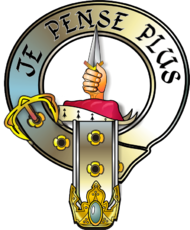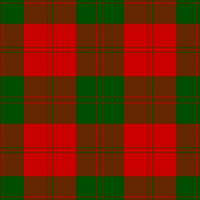- Clan Erskine
-
Clan Erskine Crest badge 
Crest: On a chapeau Gules furred Ermine a hand holding up a skene in pale Argent, hilted and pommelled Or. Motto: Decori Decus Addit Avito Profile Region Lowlands Gaelic name Arascain Chief James Thorne Erskine, The 14th Earl of Mar and
the 16th Earl of KellieHistoric seat House of Dun Clan Erskine is a Lowland Scottish clan.
Contents
History
Origins of the Name
The surname Erskine is derived from the name of Erskine, an area to the south of the River Clyde and ten miles to the west of Glasgow. The name is believed to be ancient or Old British for green rising ground.
In the 13th century during the reign of King Alexander II the first known person of the name Erskine was Henry Erskine who was also the owner of the Barony of Erskine. In modern Scottish Gaelic, the name is spelt Arascain.
Wars of Scottish Independence
During the Wars of Scottish Independence the Clan Erskine were supporters of King Robert the Bruce.
15th Century
In 1435 Alexander Stewart, the Earl of Mar died and Sir Robert Erskine claimed the title. this also made him the chief of Clan Mar. However the King withdrew the earldom in 1457 stating that it could only belong to a Royal Stewart. Ten years later Sir Robert was created the first Lord Erskine. This unlawful succession was finally interrupted by Mary, Queen of Scots, who saw that the rightful heir John Erskine, 17th Earl of Mar was restored.
16th century & Anglo Scottish Wars
During the Anglo-Scottish Wars the 4th 'Lord Erskine' led the Clan Erskine at the Battle of Flodden Field in 1513 where he was slain.
Mary Queen of Scots had been in the care of the 5th Lord Erskine and when he died she made John Erskine the 6th Lord Erskine the Earl of Mar: John Erskine, 17th Earl of Mar.
18th century & Jacobite Uprisings
At the beginning of the Jacobite Uprisings it seemed likely that the Erskines would support the British government. However the chief of Clan Erskine, John Erskine, 22nd Earl of Mar had traveled to London in 1714 expecting the post of Secretary of State of Scotland. However he was not given the job and as a result he became a Jacobite. He then raised an army of over ten thousand men for the Jacobite cause. This force was not used to its potential during the Battle of Sheriffmuir on 13 November 1715 where the Jacobites were defeated. The Earl of Mar then fled Scotland to Saint-Germain in France, whereupon he betrayed his Jacobite associates. He lost his line of the Earldom of Mar and it was not restored until 1824.
Clan Chief
The current Chief of Clan Erskine is James Erskine, 14th Earl of Mar who descends from the Earls of Mar, seventh Creation (1565) (as deemed by the House of Lords in 1875).
The Clan Mar now has a separate chief; Margaret of Mar, 31st Countess of Mar who descends from the Earls of Mar, first Creation.
Clan Castles
- The House of Dun and the Dun Estate was home to the Clan Erskine family from 1375 until 1980, but archaeological evidence shows that people have lived here for at least 9,000 years. John Erskine of Dun was a key figure in the Scottish Reformation.
- Kildrummy Castle was the seat of the Clan Erskine until it was abandoned after the failed Jacobite Uprisings in 1716.
- Corgarff Castle was acquired by John Erskine, 18th Earl of Mar in 1626.
- Kellie Castle was purchased by Sir Thomas Erskine in 1613.
- Dryburgh Abbey was given to the Earl of Mar by King James VI of Scotland in 1544.
- Alloa Tower
- Dirleton Castle
- Braemar Castle
- Rosslyn Castle
- Dunimarle Castle, near Culross, Fife, was built by the Erskine family in the 18th century
Representations in popular culture
- Elizabeth Peters' 1976 romantic suspense novel, Legend in Green Velvet, prominently featured a (fictional) member of Clan Erskine, as well as the castle and Clan history.
See also
External links
- http://www.scotclans.com/clans/Erskine/history.html
- http://www.electricscotland.com/webclans/dtog/erskine2.html
Scottish clans Clans with chiefs Agnew · Anstruther · Arbuthnott · Arthur · Bannerman · Barclay · Borthwick · Boyd · Boyle · Brodie · Broun · Bruce · Buchan · Burnett · Cameron · Campbell · Carmichael · Carnegie · Cathcart · Charteris · Chattan · Chisholm · Cochrane · Colquhoun · Colville · Cranstoun · Crichton · Cumming · Darroch · Davidson · Dewar · Drummond · Dunbar · Dundas · Durie · Elliot · Elphinstone · Erskine · Farquharson · Fergusson · Forbes · Forsyth · Fraser · Fraser of Lovat · Gayre · Gordon · Graham · Grant · Gregor · Grierson · Guthrie · Haig · Haldane · Hamilton · Hannay · Hay · Henderson · Home · Hope · Hunter · Irvine · Jardine · Johnstone · Keith · Kennedy · Kerr · Kincaid · Lamont · Leask · Lennox · Leslie · Lindsay · Lockhart · Lumsden · Lyon · MacAlister · MacBain · MacDonald · Macdonald of Clanranald · MacDonald of Keppoch · Macdonald of Sleat · MacDonell of Glengarry · MacDougall · Macdowall · MacIntyre · Mackay · Mackenzie · Mackinnon · Mackintosh · Maclachlan · Maclaine of Lochbuie · MacLaren · MacLea (Livingstone) · Maclean · MacLennan · MacLeod · MacLeod of Lewis · MacMillan · Macnab · Macnaghten · MacNeacail · MacNeil · Macpherson · MacTavish · MacThomas · Maitland · Makgill · Malcolm (MacCallum) · Mar · Marjoribanks · Matheson · Menzies · Moffat · Moncreiffe · Montgomery · Morrison · Munro · Murray · Napier · Nesbitt · Nicolson · Ogilvy · Oliphant · Primrose · Ramsay · Rattray · Riddell · Robertson · Rollo · Rose · Ross · Ruthven · Sandilands · Scott · Scrymgeour · Sempill · Shaw · Sinclair · Skene · Spens · Stirling · Strange · Stuart of Bute · Sutherland · Swinton · Trotter · Urquhart · Wallace · Wedderburn · Wemyss · Wood ·
Armigerous clans Abercromby · Abernethy · Adair · Adam · Aikenhead · Ainslie · Aiton · Allardice · Anderson · Armstrong · Arnott · Auchinleck · Baillie · Baird · Balfour · Bannatyne · Baxter · Bell · Belshes · Bethune · Beveridge · Binning · Bissett · Blackadder · Blackstock · Blair · Blane · Blyth · Boswell · Brisbane · Buchanan · Butter · Byres · Cairns · Calder · Caldwell · Callender · Campbell of Breadalbane · Campbell of Cawdor · Carruthers · Cheyne · Chalmers · Clelland · Clephane · Cockburn · Congilton · Craig · Crawford · Crosbie · Cunningham · Dalmahoy · Dalrymple · Dalzell · Dennistoun · Don · Douglas · Duncan · Dunlop · Edmonstone · Fairlie · Falconer · Fenton · Fleming · Fletcher · Forrester · Fotheringham · Fullarton · Galbraith · Galloway · Gardyne · Gartshore · Ged · Gibsone · Gladstains · Glas · Glen · Glendinning · Gray · Gunn · Haliburton · Halkerston · Halket · Hepburn · Heron · Herries · Hogg · Hopkirk · Horsburgh · Houston · Hutton · Inglis · Innes · Kelly · Kinloch · Kinnaird · Kinnear · Kinninmont · Kirkcaldy · Kirkpatrick · Laing · Lammie · Langlands · Learmonth · Little · Logan · Logie · Lundin · Lyle · MacAulay · Macbrayne · MacDuff · MacEwen · MacFarlane · Macfie · Macgillivray · MacInnes · MacIver · Mackie · MacLellan · Macquarrie · Macqueen · Macrae · Masterton · Maule · Maxton · Maxwell · McCorquodale · McCulloch · McKerrell · Meldrum · Melville · Mercer · Middleton · Moncur · Monteith · Monypenny · Mouat · Moubray · Mow · Muir · Murray of Atholl · Nairn · Nevoy · Newlands · Newton · Norvel · Ochterlony · Orrock · Paisley · Paterson · Pennycook · Pentland · Peter · Pitblado · Pitcairn · Pollock · Polwarth · Porterfield · Preston · Pringle · Purves · Rait · Ralston · Renton · Roberton · Rossie · Russell · Rutherford · Schaw · Seton · Skirving · Somerville · Spalding · Spottiswood · Stewart · Stewart of Appin · Strachan · Straiton · Strange · Sydserf · Symmers · Tailyour · Tait · Tennant · Troup · Turnbull · Tweedie · Udny · Vans · Walkinshaw · Wardlaw · Watson · Wauchope · Weir · Whitefoord · Whitelaw · Wishart · Young
Culture and society Scotland · Clan chief · Septs · Clan badge · Clan crest · Clan battles · Tartan · Bagpipes · Clearances · Kilt · Manrent · The Highlands · Battle of Culloden · Highland games · Border Reivers · Scottish heraldry · Scottish surnames
Categories:- Scottish clans
Wikimedia Foundation. 2010.

